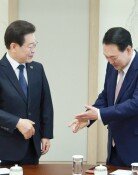Imperialistic parliament should drop its privileges first
Imperialistic parliament should drop its privileges first
Posted October. 07, 2014 05:58,
President Park Geun-hye has clearly expressed her objection to moves at the National Assembly to discuss constitutional amendment. After the normalization of the National Assembly, which was idling for a prolonged period of time, the National Assembly should focus on deliberation of bills to improve peoples livelihoods. But if it dissipates national capability to other issues through discussions about constitutional amendment, it could create another black hole in the national economy. If the Constitution fails to reflect the call of the era and stays far away from peoples sentiment, constitutional amendment can and should be freely discussed. We believe that even the president does not have the right to stem signs of such moves.
The highlight of the current Constitution is single-term presidency enacted in 1987 to meet the publics desire to prevent one mans long-term grip in power, but suggestions have been constantly made that Korea needs constitutional amendment to include new values including decentralization of power and cooperative rule. In short, the bread and butter of demands for constitutional amendment is that Korea needs to revise the current presidential system dubbed the imperialistic presidential system. In 2009, the Constitutional Research Advisory Committee under the National Assembly Speakers Office adopted a report on constitutional amendment that contained multiple plans, including a dual executive system and a four-year, two-term president and vice president system. More than 150 lawmakers with the incumbent National Assembly have formed a group to seek constitutional amendment and have held forums.
Against this backdrop, many people have concern that if discussions about constitutional amendment take the political center stage at a time when the country faces a myriad of economic agendas, it could cause paralysis of state administration. On the direction of change to hand over some of the presidential powers to the National Assembly, a more prevailing opinion in the public in recent months is that power of an imperialistic National Assembly is more serious than that of an imperialistic president. People also have strong affection for election of their leader through their own vote. Moreover, constitutional amendment requires the process that includes the presidents motion to submit it to the National Assembly, approval by two thirds of the registered parliamentarians, and a public vote. A bid to enact a special act related to investigation of the Sewol disaster alone paralyzed state administration in Korea. Starting of full-blown discussions about constitutional amendment amid lack of consensus on the issue among the public could drive the country into extremely intense conflict and serious chaos.
Before discussing constitutional amendment and pointing figure at the imperialistic presidential system, the National Assembly, which has been enjoying all different privileges yet has been incompetent and negligent at best in fulfilling its duty as legislature, should change itself before anything else. If lawmakers regain public trust by giving up privileges and reforming the nomination process of candidates for elections, they will be able to convince the public that constitutional amendment is not just a game of power among the politicians, but a grand reform aimed at securing national interest and peoples happiness. Based on such social consensus, politicians can pledge to achieve constitutional amendment in the 2016 general elections and the 2017 presidential election.







